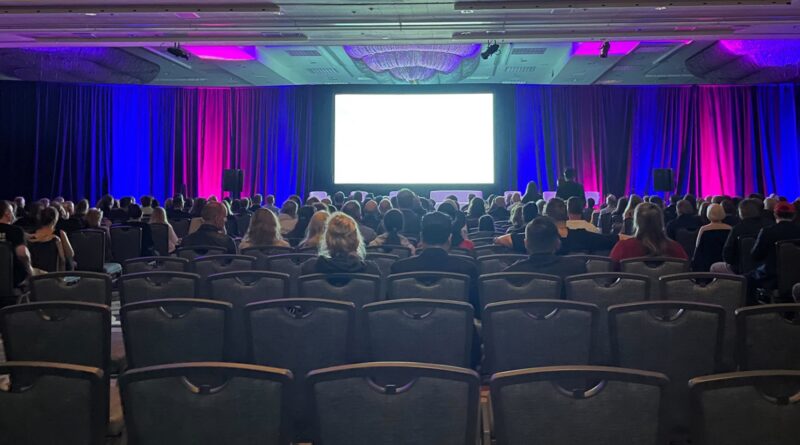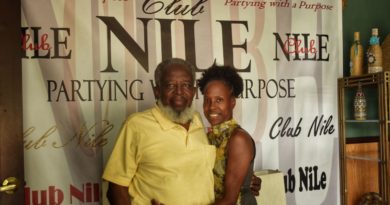Awkward Victory Lap for Covid Conspiracists

Miles Klee for Rolling Stone
On Saturday night, in the heart of the Las Vegas Strip, Covid conspiracist filmmaker Mikki Willis debuted the fourth film in his Plandemic series to an audience of about 150 fans and fellow travelers. Then, before he and his cast and crew could get into a planned Q&A session, the audience was told it had about five minutes to clear out of the ballroom venue.
“I did not know that,” Willis said after confirming with event workers the screening space had to be empty by 8 p.m.
Unlike the first three installments of Willis’ viral franchise, increasingly lengthy doom-and-gloom “documentaries” about the supposed dangers of vaccines, lockdowns, and masking that attack the medical establishment, the latest is a cheery, colorful, 20-minute affair called Plandemic: The Musical. But despite the catchy tunes and red-carpet premiere party at the Horseshoe casino hotel, the short itself was a retread of anti-masking tropes that felt curiously irrelevant in 2024, when Americans (not to mention the Centers for Disease Control and Prevention) have largely done away with such precautions. The theme felt especially off-base for Vegas, where it’s unusual to see anyone besides the the occasional blackjack dealer wearing a face mask among the crowds of partying, gambling tourists.
Shortly before the gala event, held on the second evening of RePlatform Vegas, a small business expo gathering conservative-leaning entrepreneurs and businesses, Willis told Rolling Stone that the musical “is really our way of saying it’s time for us to celebrate the things that matter, our comedy and music and all the things that people have kind of forgotten about as they’re trying to survive these times.” In that sense, he notes, it’s been a “refreshing” change from working on 2020’s Plandemic: The Hidden Agenda Behind Covid-19, a widely debunked narrative of the pandemic built around interviews with discredited research scientist and anti-vax activist Judy Mikovits, as well as the sequels that followed.
“It’s ultimately a love story,” Willis says of the new musical. “And if we can’t unify on the need for us to love each other, there’s not much hope.” He doesn’t believe this repackaging of his usual message is merely preaching to the choir, either. “I think that it will reach an audience that is different, because there’s nothing in it that’s too shocking, or too critical.”
Indeed, Plandemic: The Musical may be too tired and predictable to provoke anyone (though it could prompt copyright complaints over its use of Laura Branigan’s cover of “Gloria” and Buffalo Springfield’s “For What It’s Worth”). The breezy narrative follows a supermarket security guard played by Austin, Texas musician and preschool teacher Casey Harris as he learns his sister would rather he join a family event by video, apparently because he is unvaccinated and could put their parents at risk of infection. Dismayed, he drives to work, shaking his head at everyone with a mask on, and is particularly incredulous upon noticing a man masked alone in his car. (A joke familiar among Covid skeptics for at least four years, it still got a huge laugh.)

Miles Klee for Rolling Stone
At the store where he works, our protagonist is further disheartened by all the masked customers and employees, and, after making flirty eye contact with Gloria, his cashier co-worker crush (she has no lines), is scolded by his boss for letting his own reluctantly worn mask slip beneath his nose. Right then, he decides he’s had enough, and removes the mask to announce over the PA system that he’s quitting — at which point he launches into the first original song of the piece, triumphantly announcing the “great awakening” and inspiring everyone else to throw their masks away. Before you know it, you’ve entered an aisle-swapping medley that shifts from pop to hip-hop to country, the whole ensemble ecstatically proclaiming their freedom in song.
The supporting cast, of course, turns out to be a who’s who of Covid-denialist all-stars: Del Bigtree, Dr. Robert Malone, and Mikovits herself, who pops up from the wine shelves to quip, “Not like you weren’t warned!” when the hero informs the masses that “they lied to every last one of us.” Willis’ two young sons feature as kids happy to unmask before the uncertain adults. Other red-pilled influencers making appearances are comedian JP Sears and rapper Hi-Rez, who tweeted last month that he was initially “hesitant” to join Plandemic: The Musical because “it felt corny and strange.”
If the extended music video is out of step with the moment, it’s probably because Willis conceived it before the first three Plandemic films. He recalls that the idea originated at a large Thanksgiving dinner in 2020 — in remarks after the premiere, he referred to it as a “superspreader event” — when he and friends including musician DPAK, composer and producer for the musical, were making up songs mocking Bill Gates and Anthony Fauci. (One of Willis’ inspirations for Plandemic content is his certainty that his brother was killed by the HIV drug AZT, endorsed by Fauci during the 1980s HIV/AIDS epidemic, which has been falsely blamed for hundreds of thousands of deaths.) “It was very healing for a lot of people in the room during that time,” Willis tells Rolling Stone of the gathering. One person floated the pitch for a musical. Willis “didn’t know” that he’d make it, he says. “But that’s how it happened.”
Perhaps in an effort to position Plandemic: The Musical as more contemporary in concept, Joe Biden appears on televisions as president, urging vaccination, and there is no mention of Covid per se. Instead, society is purportedly in the grips of “Disease X,” a placeholder name health organizations use to refer to hypothetical future pandemic pathogen — and a term conspiracy theorists have used to stoke panic around another future “plandemic” used to control or silence the masses.
Sears acknowledged in the abbreviated panel after the screening that a friend had asked him, “masks, and the pandemic, isn’t that outdated?” He argued that, in fact, “this film is more relevant today than it would have been two years ago,” since “we all know that history, if it’s not remembered, is repeated, and if it’s repeated, it’s our fault.”
The musical ends with a flash-forward to a holiday dinner, and a pregnancy, and a newborn, in a triumphalist sequence that suggests the anti-mask, anti-vaccine movement has liberated society at last. It got a standing ovation from the rapturous attendees, the vast majority of whom raised their hands later on when Willis asked how many had shared the original Plandemic. As these supporters were shooed into the convention center hallway to wait on line for autographs from Willis and company, however, it wasn’t clear what relevance another satirical critique of masking would have on a populace that has already forgotten it. A few minutes walking through the crowds of Sin City will tell you that battle ended long ago.
Willis notes he doesn’t face the kind of resistance or refutation he once did. “As opposed to 2020, 2021, 2022, when it was just a lot of people that didn’t quite understand what was going on yet, we don’t get a whole lot of hate these days,” he says. Of course, for those who deal inthe controversial, acceptance can lead to a far worse fate: obscurity.




